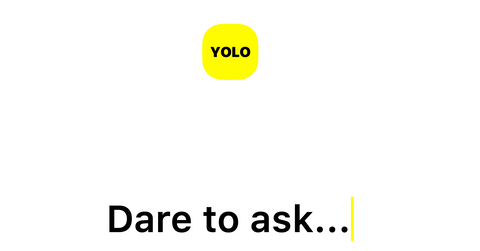Popular Teen App, Yolo, Gets Suspended After Boy Takes His Own Life
Published May 13 2021, 9:39 p.m. ET

The app Yolo (no, not #yolo), recently got suspended. But let's rewind a second. In case you're unfamiliar, Yolo is a third-party Snapchat app that lets users send anonymous messages to each other in the form of answering questions posted to Snapchat (also anonymously). When users would view the message, they'd see that it was simply sent from "Someone" and there was no way to identify the person.
While there were plenty of discussions and articles around the dangers of Yolo, like this article titled, "Why Yolo, the Anonymous Snapchat App, is a Disaster Waiting to Happen," the app surged in popularity. Back in February 2020, it even secured another $8 million in funding. As a way to combat inevitable bullying and abuse, Yolo launched a program called Here For You, which was meant to help users struggling with depression, anxiety, or trauma. Apparently that didn't work.
What happened to the Yolo app?
Snap suspended Yolo after a lawsuit was filed on Monday by Kristin Bride, a mother who lost her teen son after he took his own life after being bullied on Yolo and LMK (another Snap-integrated app — LMK was also suspended). The lawsuit claims that both Yolo and LMK failed to protect its users from harm, which resulted in the death of a teen who used the platforms.
“In light of the serious allegations raised by the lawsuit, and out of an abundance of caution for the safety of the Snapchat community, we are suspending both Yolo and LMK’s Snap Kit integrations while we investigate these claims,” a spokesperson for Snap stated, per the Los Angeles Times.
Bride is not alone. Plaintiffs who represent 92 million Snapchat, Yolo, and LMK users, are now "requesting damages for the alleged harms and misrepresentations." Bride specifically is not going after the bullies, but the apps.
The lawsuit states:
"The claims in this action are not about third-party users’ communications; hence, this action does not focus on the users’ communications themselves nor does it seek to punish the senders of the bullying and harassing messages.
Rather, the claims here are about how the anonymous messaging apps designed and distributed products and services that are inherently dangerous, unsafe, useless. For decades, anonymous messaging apps been known to cause severe and fatal harm to teenagers, hence, the harms caused by Defendants’ apps were foreseeable."
Yolo really was a disaster waiting to happen. Reading app reviews online, one can see that there must be countless of teens who have been relentlessly bullied, thanks to the nature of the app.
In a review titled "Worst app ever," a parent writes, "My 14 year old daughter got this stupid app. When I took her phone to go through it , [I] saw all the awful inappropriate comments people leave I was absolutely disgusted!!! Teenagers can be mean, [but] this is not an app a teenager should have. Wish I could find out who wrote all these comments. I immediately deleted the app. Do not recommend letting your teenager have this."

Another left a review, simply saying, "Random thoughts questions and opinions from unknown people. This could open up a world of hurt... isn’t there enough of that?"

Hopefully other social media apps take note, if they haven't already.
If you or someone you know is contemplating suicide, call the National Suicide Prevention Lifeline at 1-800-273-8255.